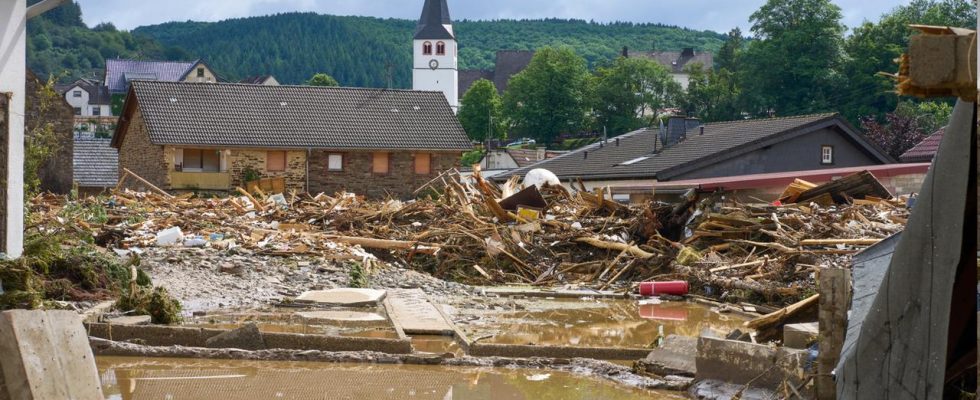faq
The public prosecutor’s office had been investigating for over two years, and it is now clear: no charges should be brought. This is how the investigators justify their decision.
What was it about?
In July 2021, 135 people died in the flood disaster in the Ahr Valley, hundreds were injured, and 9,000 houses were destroyed or damaged. Three weeks after the flood disaster, the Koblenz public prosecutor initiated an investigation. The allegations: negligent homicide and negligent bodily harm in office. Each committed through “omission.”
The investigations were directed against the then district administrator of the Ahrweiler district, Jürgen Pföhler, and the head of the technical operations management. There was evidence that the population was warned too late and inadequately about the masses of water and that people were injured and died as a result of misconduct, the public prosecutor’s office said at the time, justifying the initiation of the investigation. Now she has stopped the proceedings.
How does that justify it? Public prosecutor your decision?
According to the public prosecutor’s office, the results of the investigation are not sufficient for an indictment. The decision was based on several expert reports. An expert came to the conclusion that the flood was an extremely unusual natural disaster, the extent of which no one could have predicted, not even the district administrator at the time and the operations manager. This was credited to both of them.
Otherwise, the public prosecutor’s office is of the opinion that the former district administrator made mistakes and did not live up to his responsibilities. At that time he had completely withdrawn from disaster management and left all responsibility to the technical operations management. In addition, the district administrator and the operations manager should have warned the population better about the possible consequences of the flood.
But that is not enough for a criminal conviction. A very important point: The public prosecutor’s office would have had to prove that people could actually have been saved through dutiful, i.e. correct, action. However, this proof cannot be provided.
Why can’t this be sufficiently proven?
First of all: The public prosecutor generally only charges someone if they come to the conclusion that the conviction of the accused is more likely than an acquittal. To do this, in the specific case, they would have to provide proof that failure to take certain actions was punishable. And that certain actions would have saved lives.
To convict, however, it is not enough to say that the victims “possibly” could have been saved. Rather, one must check in each individual case, with each individual victim, whether this person would “almost certainly” still be alive if the correct action had been taken. And the Koblenz public prosecutor’s office believes that this proof was not possible here.
Why does she decide? Public prosecutor and no court?
The public prosecutor’s office is always responsible for an investigation. You are obliged to keep one if there is evidence of a crime. And it is obliged to bring charges if there is such evidence that a conviction is more likely than an acquittal. Without charges, the case will not go to court.
However, if the public prosecutor’s office believes that there is not enough evidence for a later conviction, then it will stop the proceedings. The public prosecutor’s office is obliged to be objective, neutral and impartial. The Koblenz public prosecutor’s office explicitly pointed this out again today. It must always determine all the facts, regardless of whether they speak for or against the guilt of the accused.
Can the victims defend themselves against the attitude?
Yes you can. As a first step, you can file a complaint. The public prosecutor’s office would then have to decide on this.
If the public prosecutor’s office rejects the complaint, they could, in a second step, send an application to the responsible higher regional court. The court would then examine whether the public prosecutor’s office made the correct decision or not.
If not, the court would order the public prosecutor to file another indictment. This is called enforcement proceedings.


